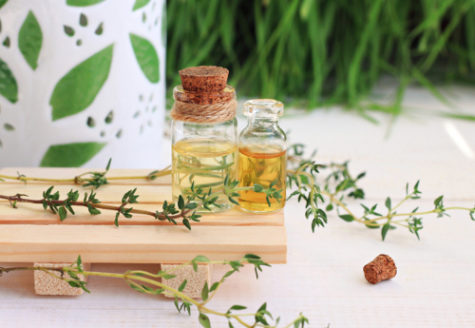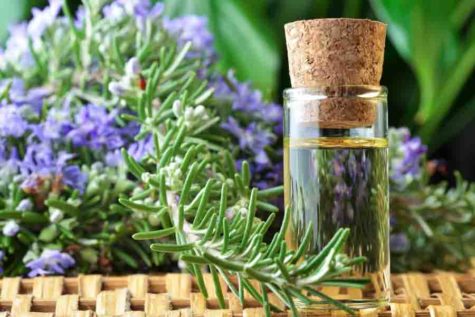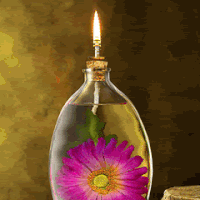Fatigue
Just Beachy Room Spray

The sweet citrusy scents of Tangerine and Bergamot combine with the clean, fresh scent of Spearmint in this room spray. The aroma reminds me of spending a warm summer day on the beach surrounded by the cool, refreshing ocean air. The result is an air freshener that’s both uplifting and energizing.
To make room spray:
- Fill 8 oz glass spray bottle about 3/4 full with distilled water
- Fill most of the rest of the way full with witch hazel
- 15 drops Spearmint essential oil
- 15 drops Tangerine essential oil
- 10 drops Bergamot essential oil
- Put on sprayer top and shake well to mix
To use: Shake bottle gently before each use. Spray into the air to freshen room. Use as often as needed.
Source: One Essential Community
Perk Up Diffuser Blend

Here is a great Diffuser Blend to try, it will make you home smell good and it is perfect for a natural perk up in the morning before work or school:
- 2 drops Lemon essential oil
- 2 drops Orange essential oil
- 2 drops Peppermint essential oil
- 2 drops Rosemary essential oil
Source: Loving Essential Oils
Focus & Get Shit Done Blend
These recipes are for a 4 oz. spray bottle, but of course they can be doubled or halved as needed.
You will need:
- Spray Bottle (4 oz)
- 1 tablespoon of vodka or rubbing alcohol
- 6 tablespoons of water
- 8 drops of Peppermint essential oil
- 10 drops of Grapefruit essential oil
- 10 drops of Rosemary essential oil
- Optional – a bottle sized piece of one of your ingredients (sprig of Rosemary or Peppermint)
Put the vodka (or rubbing alcohol) into the bottle, and then add the essential oils. Shake well. Add the optional herb if desired. Then add the water. Shake gently before each use.
Source: Salome Gemme
Thyme Essential Oil
There are many types of thyme, some of which can be used safely in all situations and some which cannot. Thyme oil ranks high on the versatility index of essential oils. Diffused, it boosts wellness, fortifying the lungs and clearing the breath.
Thyme has notable antiviral, antibiotic, antiseptic, and diuretic properties and should be used with great care.
- Application:
Thyme oil should never be used undiluted on the skin. It can be applied topically at very low dilutions of 1% or less or used in a blend as a compress. It may also be used in direct inhalation or diffused. Add to food or soy / rice milk as a dietary supplement or flavoring.
- Fragrant Influence:
It may be beneficial in helping to overcome fatigue and exhaustion after illness.
- Safety Data:
Overuse of Thyme essential oil can stimulate the thyroid gland and lymphatic system. Like many good things, it must be used in moderation. It should never be applied to the skin undiluted and should not be used on children unless it is within the chemotype Thyme linalol. It can be irritating for the mucus membranes and it should not be used by those who are pregnant.
Thyme is a vital component of the Basic Care Kit because of its powerful antiviral properties. When flu is around it is a wonderful oil to have on the diffuser. It assists in the elimination of toxic wastes from the body. It is used in the treatment of a wide range of conditions including whooping cough, warts, rheumatism, neuralgia, fatigue, and acne.
Inhaled, Thyme oil is uplifting and relieves depression, stimulates the respiratory system and relieves the spasm of asthma, is an antiseptic for all sorts of muccoid conditions, kills bacteria in the air, and is used for bronchitis or pneumonia. Thyme oil is also mildly sedating and can be used for insomnia.
Internal dose is three to five drops in honey water three times a day.
It is also extremely useful in antiseptic powders, hair and skin care regimes, and cooking. Just to make it a perfect all-rounder, thyme will discourage all manner of parasites and insects from invading your home.
In Greek, “thymos” means “to perfume”; one of thyme’s many traditional uses was in fumigation. Ancient Egyptians used thyme oil for embalming. In many ancient cultures, it was believed that thyme instilled the virtues of strength, energy, and bravery.
Variations
There are six different chemotypes of T. vulgaris:
- Thymol – low altitude close to the sea
- Carvacrol – low altitude close to the sea
- Linalool – in the sun on exposed slopes
- Geraniol – rare and mixed with linalool at high altitudes
- Thuyan-4-ol – very rare and located between thymol/carvacrol and linalool
- α-terpinyl – in the Eastern Mediterranean
Thyme Linalol is especially recommended to kill bacteria and relieve discomfort. It is non-irritating and gentle, and especially recommended for treating children and the elderly or infirm.
Thyme Thuyanol is quite new. It captures much of the overall strength and stimulating properties of the “regular” essence of Thyme as well as its anti-infectious properties. The difference lies in the much higher content of highly desirable terpene alcohols (non-toxic) and the much lower content of irritant and slightly toxic phenols. This oil is stronglhy germicidal (yet non-irritant) and a very good liver stimulant.
Information collected from various sources
Rosemary Essential Oil
Rosemary is both a physical and mental stimulant, which makes it a good oil to have in the morning bath, while also being excellent in the treatment of all muscular conditions, making it the perfect oil for a bath after a long tiring day.
- Application:
Diffuse, inhale, or apply topically on location. Add to food or soy / rice milk as a dietary supplement or flavoring.
- Fragrant Influence:
Helps overcome mental fatigue and improves mental clarity and focus.
- Safety Data:
Rosemary essential oil should not be used by those who suffer from hypertension, those who are pregnant and those who have epilepsy.
Tisserand and Young warn that Rosemary Oil is potentially neurotoxic, depending on the level of camphor present in the oil. They also warn not to use on or near the face of infants and children. They recommend dermal maximum s of 16.5% for Rosemary Camphor and 6.5% for Rosemary Verbenone.
Rosemary has become very popular as a medicinal plant, because it can be used for so many different conditions and symptoms. The oil is known to have rejuvenating properties so is often used in skin and hair care and the claimed memory boost means that it is a popular oil with students.
This antiseptic oil is used in the treatment of muscular spasms, arthritis, rheumatism, depression, fatigue, memory loss, migraine, headaches, coughs, flu, and diabetes, among other conditions.
It is also very useful in beauty treatments, being used in hair care and acne and cellulite remedies. For the sportsman, cook, and gardener, rosemary is invaluable.
Rosemary was part of the “Marselles Vinegar” or “Four Thieves Vinegar” used by grave-robbing bandits to protect themselves during the 15th century plague.
The name of the oil is derived from the Latin words for dew of the sea (ros + marinus). According to folklore history, rosemary originally had white flowers; however, they turned red after the Virgin Mary laid her cloak on the bush.
Since the time of ancient Greece (about 1000 BC), rosemary was burnt as incense. Later cultures believed that it warded off devils, a practice that eventually became adopted by the sick who then burned rosemary to protect against infection. Until recently, French hospitals used rosemary to disinfect the air.
Variations
Several chemotypes of R. officinalis have been defined, depending on where the plant is grown and what the local conditions are. The main three are as follows:
- Camphor-Borneol
- Cineole
- Verbenone
The camphor-borneol variety is considered the best stimulant whereas the verbenone is considered the most gentle and often used in topical preparations. One of the “Oils of Protection”, pleasant, warming and mildly sweet rosemary verbenone is a softer version of the more common and pungent cineole variety. Rosemary Cineole is sometimes preferred for use in respiratory and circulatory issues.
Information collected from various sources






